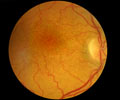Risk for age-related macular degeneration is lowered by consuming higher levels of the yellow plant pigments lutein and zeaxanthin.
According to a report in the September issue of Archives of Ophthalmology, risk for age-related macular degeneration is lowered by consuming higher levels of the yellow plant pigments lutein and zeaxanthin.
Age-related macular degeneration (AMD) occurs when the macula, the area at the back of the retina that produces the sharpest vision, deteriorates over time. It is a leading cause of irreversible blindness among elderly people of European descent, according to background information in the article.The Age-Related Eye Disease Study Research Group assessed 4,519 individuals who were age 60 to 80 when they enrolled in 1992 through 1998. At that time, photographs were taken of their retinas to determine if they had AMD, and if so, to which of four stages the condition had progressed. The participants also completed a food frequency questionnaire that measured how often they consumed foods rich in certain vitamins, minerals and other nutrients. These included lutein, zeaxanthin, beta-carotene, lycopene and vitamins C and E.
The participants were divided into five groups based on the amount of each nutrient they consumed. Those who had the highest levels of lutein and zeaxanthin were significantly less likely than those in the group with the lowest levels to have advanced AMD. They were also less likely to have large or numerous intermediate drusen, yellow or white deposits on the retina or optic nerve head that are a sign of AMD. No associations were seen with any of the other nutrients.
Lutein and zeaxanthin, also called carotenoids and found in yellow and dark leafy vegetables, may affect processes through which light and oxygen damage the eyes, the authors note. “Lutein and zeaxanthin have the capacity to filter short-wavelength light associated both with photochemical damage and the generation of reactive oxygen species that attack cellular lipids, proteins and nuclear material; these carotenoids also have the capacity to reduce the potency of nascent reactive oxygen species,” which damage cells, they write.
“If these cross-sectional results can be confirmed in prospective samples and experimental studies, lutein and zeaxanthin may be considered as useful agents in food or supplement-based interventions designed to reduce the risk of AMD,” the authors conclude.
Source-Eurekalert
LIN /J
 MEDINDIA
MEDINDIA
 Email
Email










